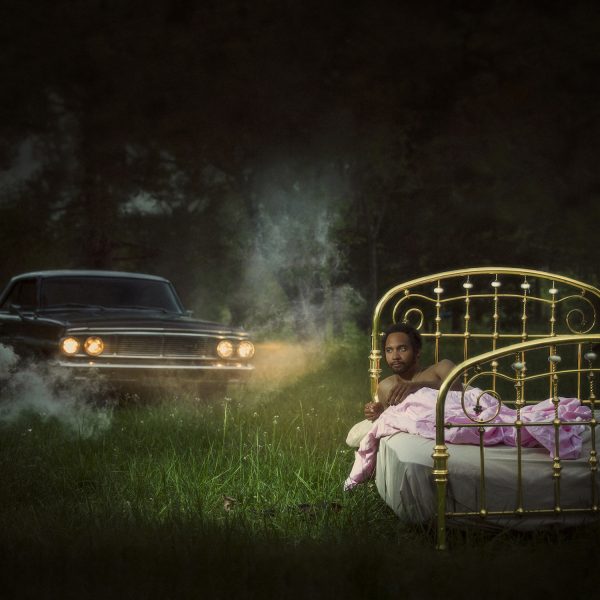
‘Tigers Blood’ by Waxahatchee
One of the hardest working singer-songwriters in the game is named Katie Crutchfield. She was born in Alabama, grew up near Waxahatchee Creek. Skipped town and struck out on her own as Waxahatchee. That was over a decade ago. Crutchfield says she never knew the road would lead her here, but after six critically acclaimed albums, she’s never felt more confident in herself as an artist. While her sound has evolved from lo-fi folk to lush alt-tinged country, her voice has always remained the same. Honest and close, poetic with Southern lilting. Much like Carson McCullers’s Mick Kelly, determined in her desires and convictions, ready to tell whoever will listen.
And after years of being sober and stable in Kansas City–after years of sacrificing herself to her work and the road–Crutchfield has arrived at her most potent songwriting yet. On her new album, Tigers Blood, Crutchfield emerges as a powerhouse–an ethnologist of the self–forever dedicated to revisiting her wins and losses. But now she’s arriving at revelations and she ain’t holding them back.
Crutchfield says that she wrote most of the songs on ‘Tigers Blood’ during a “hot hand spell,” while on tour in the end of 2022. And when it came time to record, Crutchfield returned to her trusted producer Brad Cook, who brought her sound to a groundbreaking turning point on 2020’s Saint Cloud.
They hunkered down at Sonic Ranch in Tornillo, Texas–a border town known for cotton and pecans–and searched for another turn, waited for a sign. Initially, MJ Lenderman, Southern indie-rock wunderkind (much like Crutchfield when she started out) came to play electric guitar and sing on “Right Back To It.” But as soon as they tracked it, Cook told Lenderman he had to stay for the rest of the album. And he did.
“Right Back To It” is ‘Tigers Blood’’s lead single. A nod to country duets like Gram and Emmylou, winding over a steadfast banjo from Phil Cook. Together, Crutchfield and Lenderman harmonize on the chorus: “I’ve been yours for so long/We come right back to it/I let my mind run wild/Don’t know why I do it/But you just settle in/Like a song with no end.” Crutchfield says it’s the first real love song she’s ever written.
The song “Bored” opens with blase drum beats from Spencer Tweedy that crash under Crutchfield as she throws her voice high: “I can get along/ My spine’s a rotted two by four/Barely hanging on/My benevolence just hits the floor.” Lenderman’s scuzzy riffs and Nick Bockrath’s climbing pedal steel add power to the album’s most ‘Southern Rock’ a la Drive-By Truckers moment.
“365” is a story of recognition told from a hard-won place of self-acceptance/forgiveness. Crutchfield initially started writing it for Wynonna Judd, with whom she has written and performed in the past, until the lyrics started hitting closer and closer to home. The writer Annie Ernaux says, “writing is to fight forgetting.” Like Lucinda Williams, Crutchfield’s lyrics are memoir. Throughout ‘Tigers Blood’ Crutchfield is addressing a “you,” but the ‘you’ in “365” evokes raw closeness, vulnerability. “Ya ain’t had much luck but grace is/In the eye of the beholder/And I had my own ideas but/I carried you on my shoulders, anyways.”
“365” is essentially ‘Tigers Blood’’s aria about addiction, with little to no accompaniment to Crutchfield’s voice. Her backing band is hushed, as if the spotlight’s coming down on her, alone on the stage, giving her testimony. Crutchfield slings her voice with arresting precision, reaching its highest harmony on the whole album. “So when you kill, I kill/And when you ache, I ache/And we both haunt this old lifeless town/And when you fail, I fail/ When you fly, I fly/And it’s a long way to come back down.”
“365” circles back to the beginning of ‘Tigers Blood,’ where Crutchfield’s words ring clear as a bell. Album opener “3 Sisters” starts with Crutchfield singing over hymn-like piano chords: “I pick you up inside a hopeless prayer/I see you beholden to nothing/I make a living crying it ain’t fair/And not budging.” ‘Tigers Blood’ is Crutchfield at her most confident and resilient. Staring straight at the truth, forgiving but not forgetting, not batting an eye.
— Ashleigh Bryant Phillips

Tré Burt
Tré Burt was standing on a stage in Philadelphia in early 2023 when the latest bit of bad news arrived: His grandfather, a native of that very city, was dead. It wasn’t entirely unexpected. For years, Tommy Burt had struggled with early-onset dementia, slipping away a bit more each time Burt saw him. Burt even began recording his grandfather, letting his tape recorder roll as they had some of their final conversations. He wanted to preserve those moments, however repetitious or fragmented they might be, before the opportunity vanished forever. In fact, Traffic Fiction—Burt’s third album on Oh Boy Records and an unexpected musical reinvention rooted in his new and idiosyncratic version of classic soul—also preserves their relationship by committing another key piece of it to tape. The soul that animates so many of these 14 tracks? That was the music shared by grandfather and grandson.
Burt’s California childhood was not easy. His parents split when he was young, so he would often shuttle between their houses in Sacramento and the Bay Area. He was a bit of a wild child, too. From time to time, though, he would accompany his father to work at a plant nursery, riding shotgun in a 1975 Cadillac Seville as they listened to The Delfonics and Otis Redding, Marvin Gaye and The Temptations. Those drives were his sanctuary, that music their blessed score.
But as Burt became a musician himself, he was a peripatetic troubadour, tapping into American folk and blues partly as a matter of necessity—it’s not sensible to busk, after all, with some sophisticated band at your back. Bits of those other roots and compositional ambitions finally emerged on 2021’s You, Yeah, You, the vivid result of Burt’s first proper studio sessions. On Traffic Fiction, they are in full bloom, from the sweet country-soul surrealism of the title track to the skywriting rock of “2 For Tha Show,” Burt as urgent and commanding as he’s ever been. Traffic Fiction is the sound of Burt confidently bending a sentimental past to his present will.
To get to this new alchemy of soul, dub, and more than a little punk, Burt returned to the basics—self-recording in sequestered silence. During a Canadian tour, he set aside a few days to stay in a friend’s spare apartment and write, renting enough instruments from the affordable gear emporium Long & McQuade to build a makeshift studio for his GarageBand demos. The title track soon emerged, its effortless magnetism prompted by a poem he’d written about stupid city congestion and a piece by saxophonist and singer Gary Bartz.
Burt recognized he had found the sound of the next album, so he booked another rural cabin in Canada for 9 days and rented more guitars, basses, and the same keyboard he’d bought during the You, Yeah, You sessions. For the better part of a lifetime, Burt had told himself he didn’t have the chops to sing like those childhood heroes from the Cadillac days. But now, as he built his one-man-band demos before returning to Nashville’s The Bomb Shelter to work with a trusted band of pals and esteemed producer Andrija Tokic, his versions of those sounds poured out in circumspect love songs and joyous tunes of existential reckoning. His grandfather was dying. The world was struggling with a pandemic and the specter of a third world war. But Burt gave himself permission to have fun and be funny, to let these songs lift him and, eventually, maybe others, too.
Traffic Fiction indeed feels like a buoy amid these turbulent times, something that pulls us above the wreckage. The love-or-something-like-it songs are crucial. With its rocksteady motion, rainbow keys, and slippery riff, “Wings for a Butterfly” is Burt’s honeyed plea to at least try a relationship out. Like The Beatles rebottled in Muscle Shoals, the brilliant “To Be a River” crescendos in a litany of all the things Burt knows he can be for someone—“your favorite word, a letter you read.” It is pure infatuation.
Even ostensible breakup songs luxuriate in the wonder of existence. “Santiago” recounts an overseas tryst that ended too soon, Burt jubilantly narrating moments of mirth and lust over go-go keyboards and a beat so simple and propulsive The Ramones would have loved it. And during “Piece of Me,” Burt turns the sting of ending it into an anthem of wishful thinking alongside sashaying organs and rail-grinding guitar. Maybe one more chance is all he needs? “You like me better when I’m in pain,” he sings slyly. “Well, baby, just look at me now.” Amid these warped jewels of psychedelic soul, you’ll find yourself pulling for Burt, hoping the world can come to its senses on his behalf.
Burt first earned notice for his imaginative and trenchant social protest songs, where he’d capture some corrosive element of American life—unchecked capitalism, unwavering racism, so on—in a compelling snapshot. Traffic Fiction isn’t that kind of album, necessarily, though his defiance hasn’t disappeared. Referencing his ancestral homeland of Promised Land, South Carolina, “All Things Right” scorns apathy and bureaucracy, the way we strand each other via our own pursuits. “I’ll never be free/but I can pretend,” he snaps with verve during the verse of “Kids in the Yard,” a mighty theme of self-empowerment. Burt finds the joy even here, pushing past problems rather than succumbing to obstacles.
And isn’t that a crucial role of music, especially now—to show us how to handle our burdens with aplomb and vision, to model the behavior of persevering with élan? At three points during Traffic Fiction, Burt interweaves bits of those recorded conversations with his late grandfather, Tommy. They talk about Stevie Wonder, Burt’s career and the fatigue it can bring, and, finally, the sense that he’s carrying on a family tradition through these records. It’s a reminder not only of what Burt experienced while making Traffic Fiction but also of what he overcame. He found strength in the soul of his youth, and, for that, he’s never sounded stronger.



